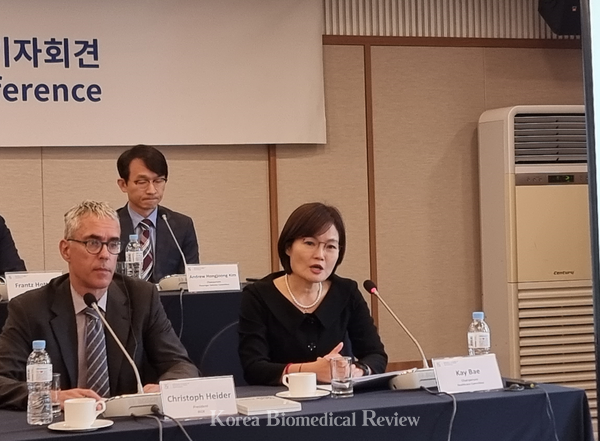Amidst growing concerns and debates over the healthcare insurance system, European pharmaceutical companies have weighed in, highlighting the need to improve access to treatment for patients in Korea.

The 2023 EU Chamber of Commerce in Korea (ECCK) White Paper, detailing proposals concerning the regulatory environment in Korea, provides insight into the perspectives of European pharmaceutical companies.
Over the past three years, the healthcare sector consistently dominated the list of concerns, with a total of 32 proposals in 2020, 14 in 2021, and 22 in 2022.
However, the track record of these suggestions being adopted by the government remains slim over the past few years. Of the 22 proposals last year, only five were accepted. Two are undergoing long-term reviews, and 15 were not accepted.
The accepted proposals focused on transparency in decision-making processes, improving access to medication for complex chronic metabolic diseases, and increasing participation from the vaccine industry in the national immunization program.
This year, the healthcare sector is second only to the automotive industry, presenting 10 proposals.
This year's recommendations cover a broad spectrum, including reforms in the pricing system to reward innovative value, expanding risk-sharing agreement (RSA) and pharmacoeconomic evaluation (PE) exemption measures to boost patient accessibility, and enhancing newborn screening for rare diseases.
Proposals also addressed the importance of improved vaccination programs and addressing cost inflation and exchange rate fluctuations for diagnostic medical devices due to Covid-19.
Speaking at the press conference celebrating the publication of the ECCK 2023 White Paper on Thursday, Bae Kyung-eun, Chairperson of ECCK's Healthcare Committee and country lead of Sanofi, emphasized, "The current government has announced a regulatory innovation plan for the biohealth industry and a plan to foster the pharmaceutical-bio industry to become a globally recognized sector."
The ECCK is grateful for policy support to strengthen Korea's healthcare industry's global competitiveness and such support must continue, she added.
Yet, she voiced her concerns, saying, "Korea's current reimbursement, including the terms and conditions for new drugs and new technologies, is not yet adequately reflective of the realities of the market, nor does it reflect the societal need to improve patient outcomes."
For example, Bae highlighted a report by the Pharmaceutical Research and Manufacturers of America (PhRMA), which revealed that out of 460 new drugs released in the market from 2012 to 2021, only 22 percent were covered by insurance in Korea.
"This percentage is significantly lower than Japan's 48 percent and the G20 average of 28 percent," she said. "If Korea doesn't recognize the value of innovative new drugs and medical technologies through significant reforms, not only will the introduction of these drugs in Korea be delayed, but it may also stifle investment in innovation."
Drawing a parallel with Europe, Bae explained, "In Europe, they consider various sociological perspectives, such as disease severity, societal costs, quality of life, and relative medical value, to assess reimbursement appropriateness."
Such a comprehensive approach boosts access to innovative treatments and reduces societal costs, she said.
Bae stressed that if access to innovative new drugs is improved for patients suffering from severe or rare diseases, social and economic benefits will arise by allowing patients to cure their diseases or enjoy a healthier life, consequently further reducing health insurance budgets.
During the conference, Bae also pointed out the unchanged pricing for diagnostic devices critical for infectious disease diagnosis, despite the cost surge due to Covid-19.
"Just like new drugs, we need to effectively provide value-based medical technology to improve patient accessibility and increase investments in innovative technology," Bae said.

